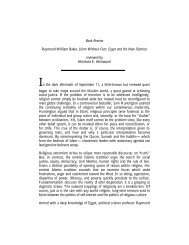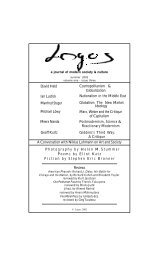Michael J. Thompson Stephen Eric Bronner Wadood Hamad - Logos
Michael J. Thompson Stephen Eric Bronner Wadood Hamad - Logos
Michael J. Thompson Stephen Eric Bronner Wadood Hamad - Logos
Create successful ePaper yourself
Turn your PDF publications into a flip-book with our unique Google optimized e-Paper software.
Stanley Aronowitz<br />
conservative politicians, union leaders remained faithful to the Democratic<br />
party and to the New Deal, which was rapidly fading into history. Mills and<br />
his collaborator, Helen Schneider, found that the concept that working people<br />
needed a labor party to truly represent their political interests had declined<br />
from the perspective of most labor leaders whereas a decade earlier, the apex of<br />
industrial unionism, a majority favored the formation of such a party, despite<br />
their expedient support of the Democrats.<br />
You might say that Mills’s notion of power owes much to Machiavelli’s The<br />
Prince. Just as Machiavelli reminds the prince that the old rules of the feudal<br />
oligarchy no longer suffice to retain power but that a public has formed which<br />
intends to call the ruler to account for his actions, in his book on the labor<br />
leaders Mills is, at first, in dialogue with a leadership increasingly attracted to<br />
oligarchical rule, and to the liberal center and whose love affair with established<br />
power has lasted to this day. His study admonishes the labor leadership to<br />
attend to the post-war shift that endangers theirs and their members’ power.<br />
Arguing that the “main drift” is away from the collaboration between business<br />
and labor made necessary and viable by the war he suggests that labor leaders of<br />
“great stature” must come to the fore before labor is reduced. “Now there is no<br />
war,” but there is a powerful war machine and conservative reaction against<br />
labor’s power at the bargaining table.<br />
“Today, knit together as they are by trade associations, the corporations<br />
steadily translate economic strength into effective and united political power.<br />
The power of the federal state has increased enormously. The state is now so<br />
big in the economy, and the power of business is so great in the state, that<br />
unions can no longer seriously expect even the traditional short-run economic<br />
gains without considering the conditions under which their demands are<br />
politically realizable.” Top down rule, which implies keeping the membership<br />
at bay is, according to Mills, inadequate to the new situation where a militaryindustrial<br />
alliance was emerging, among whose aims was to weaken and<br />
otherwise destroy the labor movement.<br />
How to combat this drift? Mills forthrightly suggests that the labor leader<br />
become the basis for the formation of a “new power bloc.” Rather than make<br />
deals on the top with powerful interests, “he will have to accumulate power<br />
from the bottom. . . . If the democratic power of members is to be used<br />
<strong>Logos</strong> 2.3 – Summer 2003




